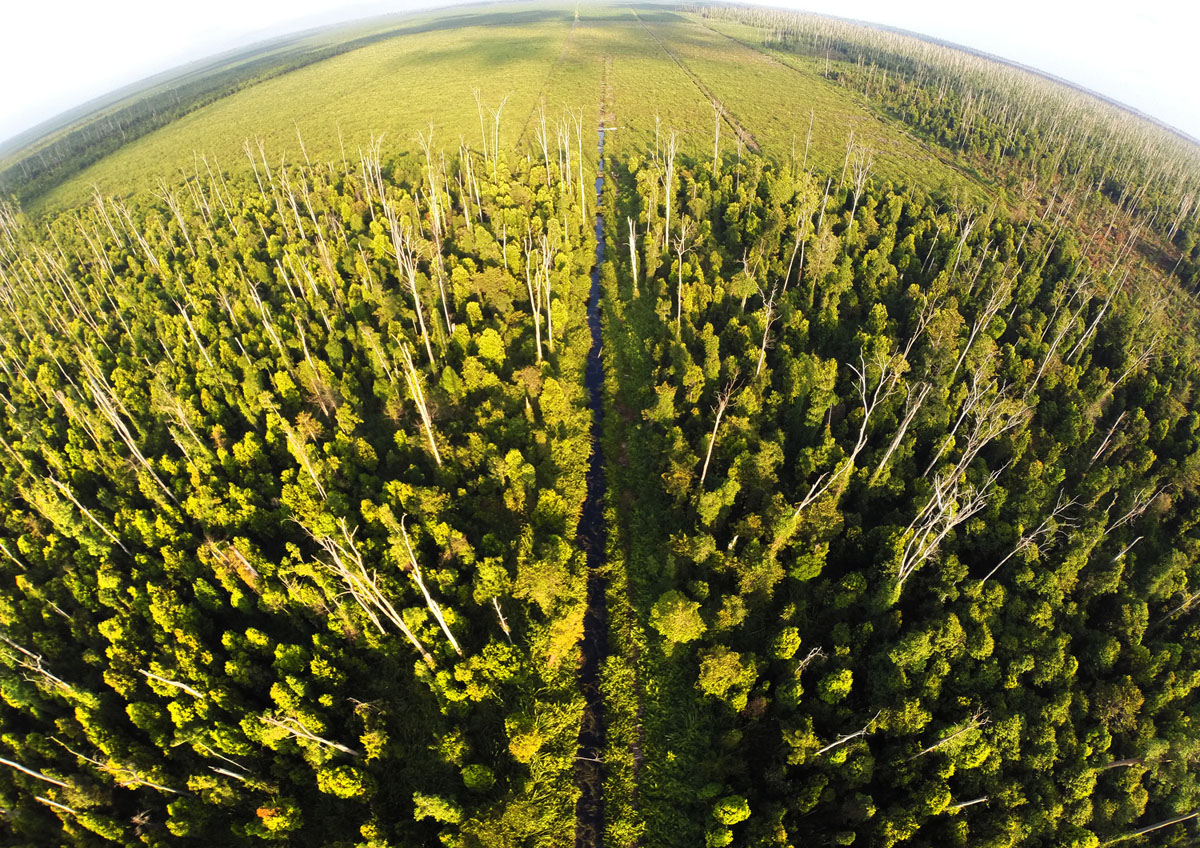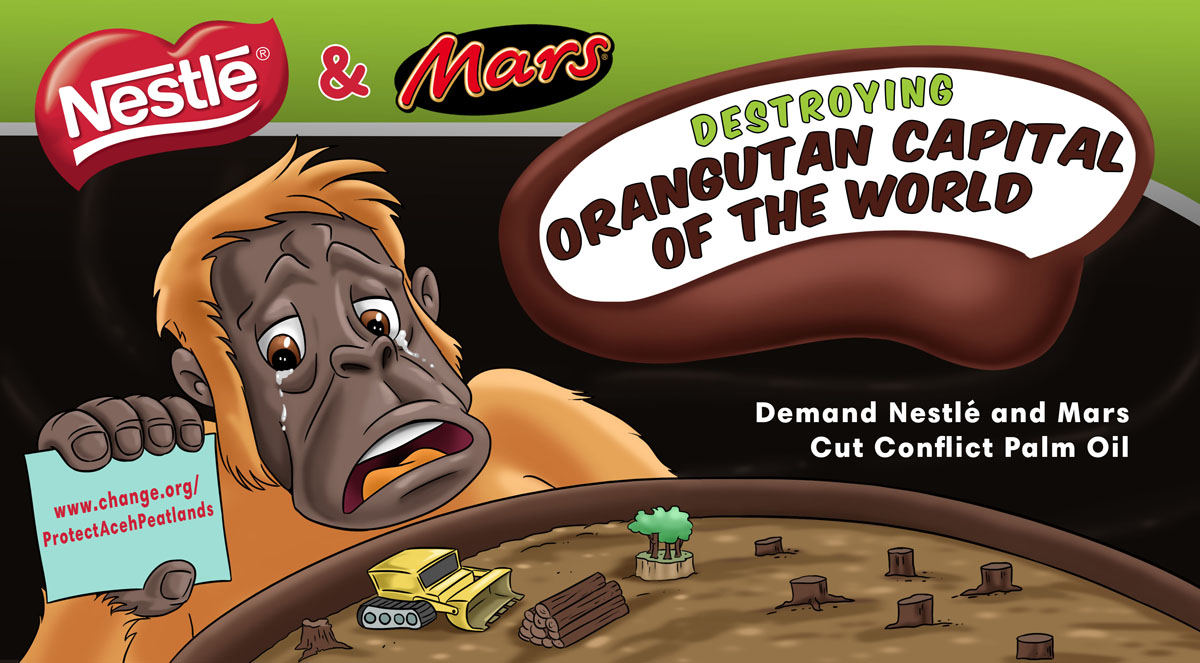Rogue Conflict Palm Oil Producer Found Still Supplying Global Market
Within Indonesia’s notoriously corrupt, exploitative and destructive palm oil plantation industry, it takes a high degree of well documented bad behavior to stand out among the worst of the worst. But PT. Kallista Alam (PT KA), a palm oil company operating in the Aceh Province of Sumatra, is such a bad actor, and has been so bad for so long, that it sits apart among its peers as a truly rogue company that should be completely toxic to the reputation of any buyers found to still be doing business with it.
At least as far back as 2012, PT. Kallista Alam is responsible for intentionally using fire to destroy some of the most valuable habitat left for endangered Sumatran orangutans in the Tripa peat swamp region. Tripa peatland is one of just three remaining lowland rainforest ecosystems on the west coast of the Leuser Ecosystem. The area is globally important for conservation, both because it is extremely biologically rich and also because its peat ecosystems sequester immense amounts of carbon that is released as pollution into the atmosphere when drained and burned. After years of legal battle, PT. Kallista Alam was found guilty in 2015 by a district court in Aceh of purposefully burning a minimum of 10 square kilometers of this unique tropical forest—an action prohibited under Indonesian law.

In 2015 the Supreme Court of Indonesia rejected an appeal from the palm oil developer and upheld the $26 million fine against the company. Years later though, Kallista Alam has yet to pay what it owes. Instead, it has engaged in an all out strategy of dodging and delaying its responsibilities to pay fines as ordered by the Supreme Court.
In late 2018, following advocacy against PT KA by Indonesian NGOs, Banda Aceh’s highest court rejected PT KA’s lawsuit against the Indonesian Government’s Ministry of Environment and Forestry (MoEF) which attempted to undermine the Supreme Court’s decision. PT KA was still required to pay its fines. The Suka Makmue district court is now preparing to auction 5,769 hectares of PT KA’s palm oil plantation land, where illegal burning occurred, unless it pays the fines it legally owes. But both visits by land appraisers to PT KA’s plantation, in September and November 2019, were blocked by the company’s security and individuals that are believed to have been arranged by the company to block access.
Despite extensive NGO campaigning and MoEF’s repeated victories in the courts, in July 2019 PT KA submitted a new case against the Ministry of Environment and Forestry to delay and avoid the verdict being executed. The case is ongoing but PT KA has not yet presented any evidence to substantiate its claim that it was not responsible for the fires and court dates have been postponed due to the coronavirus crisis. Additional cases have been filed by community members in the Pulo Kruet Village who have claims to lands within the permit area for the PT KA plantation that has been revoked and is proposed for auction.
Worse, RAN’s undercover investigators reveal that the rogue company continues to harvest oil palm grown off of the land located in its palm oil plantation located next to the concession subject to the legal cases and is actively selling its crude palm oil to palm oil processors and traders known to supply Nestlé1, Mars2 and the global market. This plantation covers over 6500 hectares and was obtained without the consent of local communities in Kuala Seumanyan and at the expense of Tripa’s peatlands and forests that recently provided the most dense habitat for Sumatran orangutans on the planet.
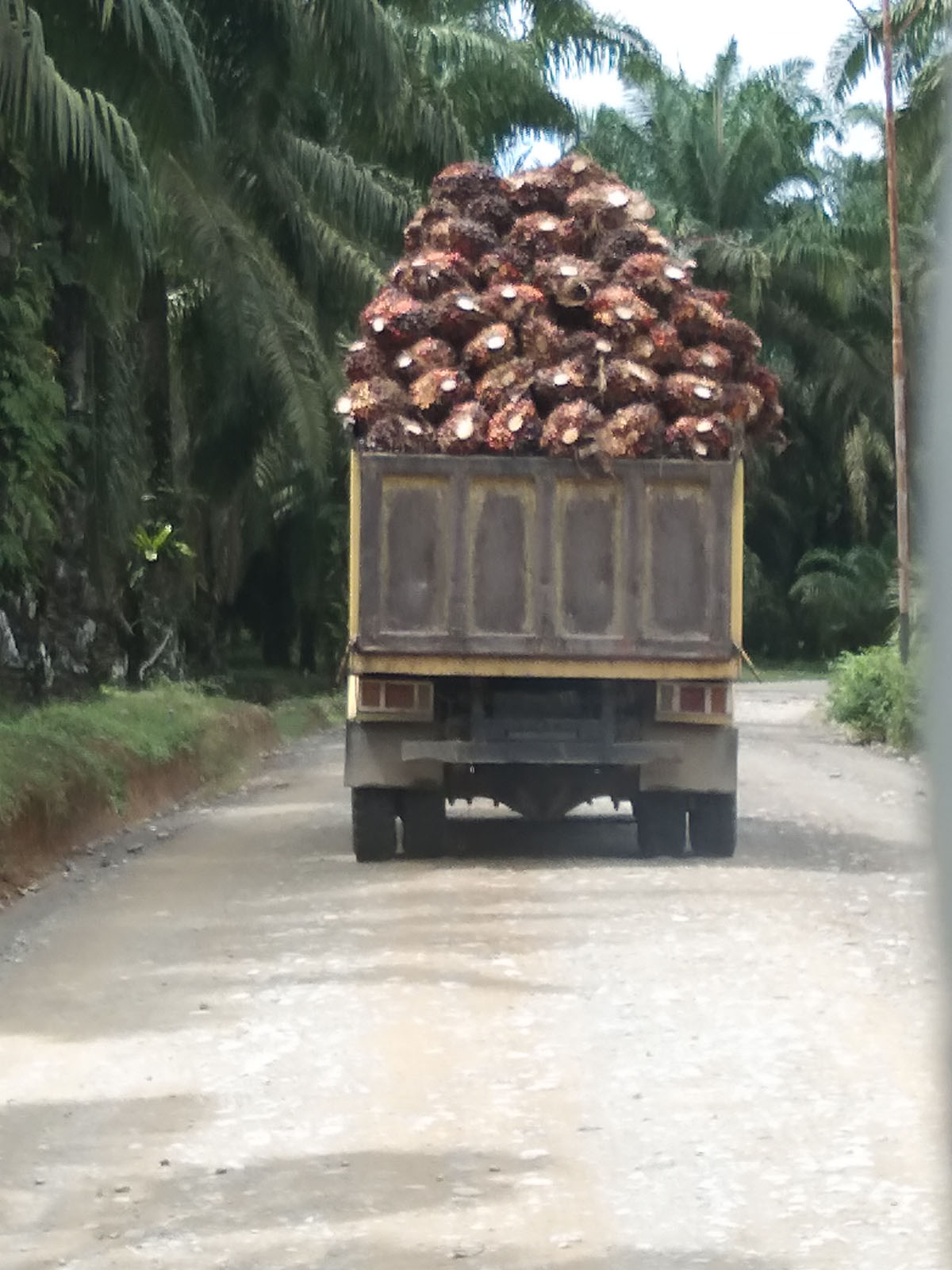
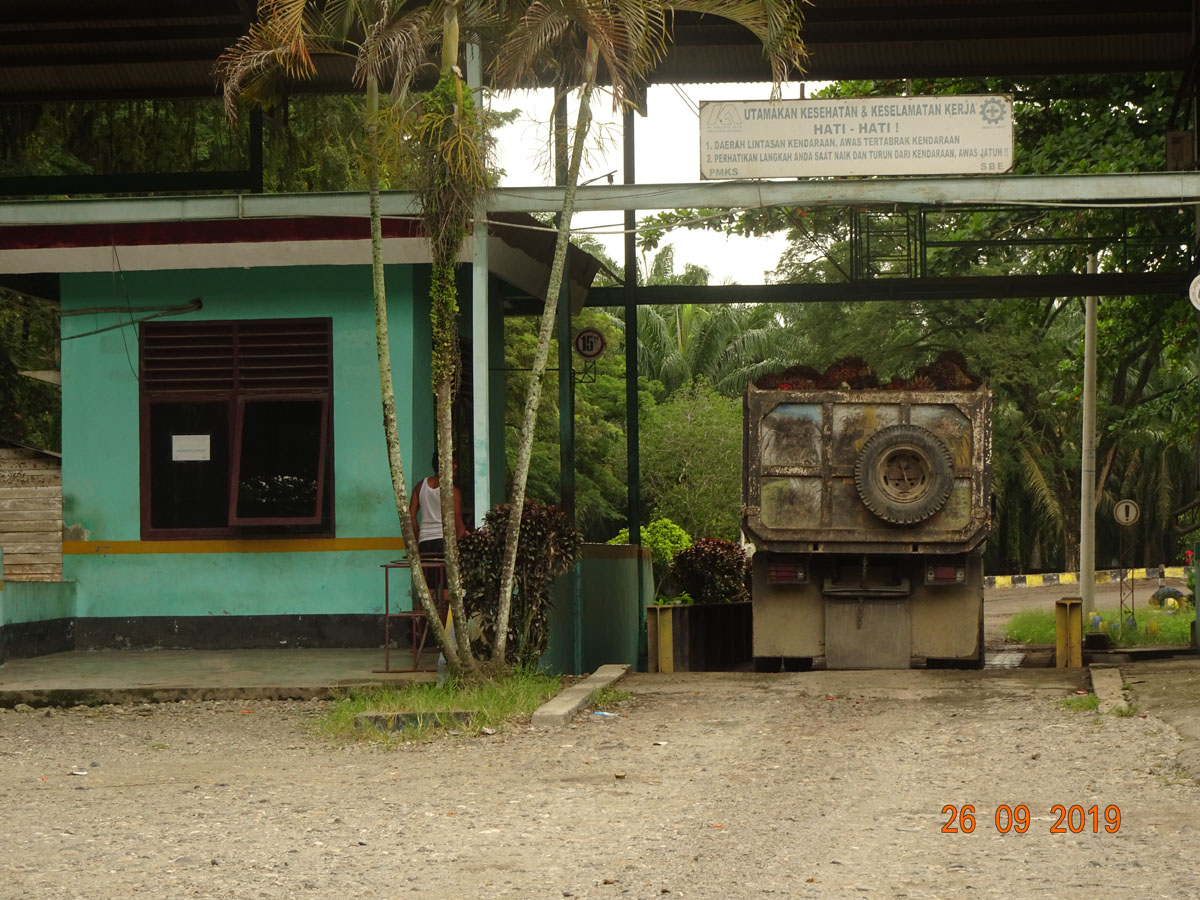
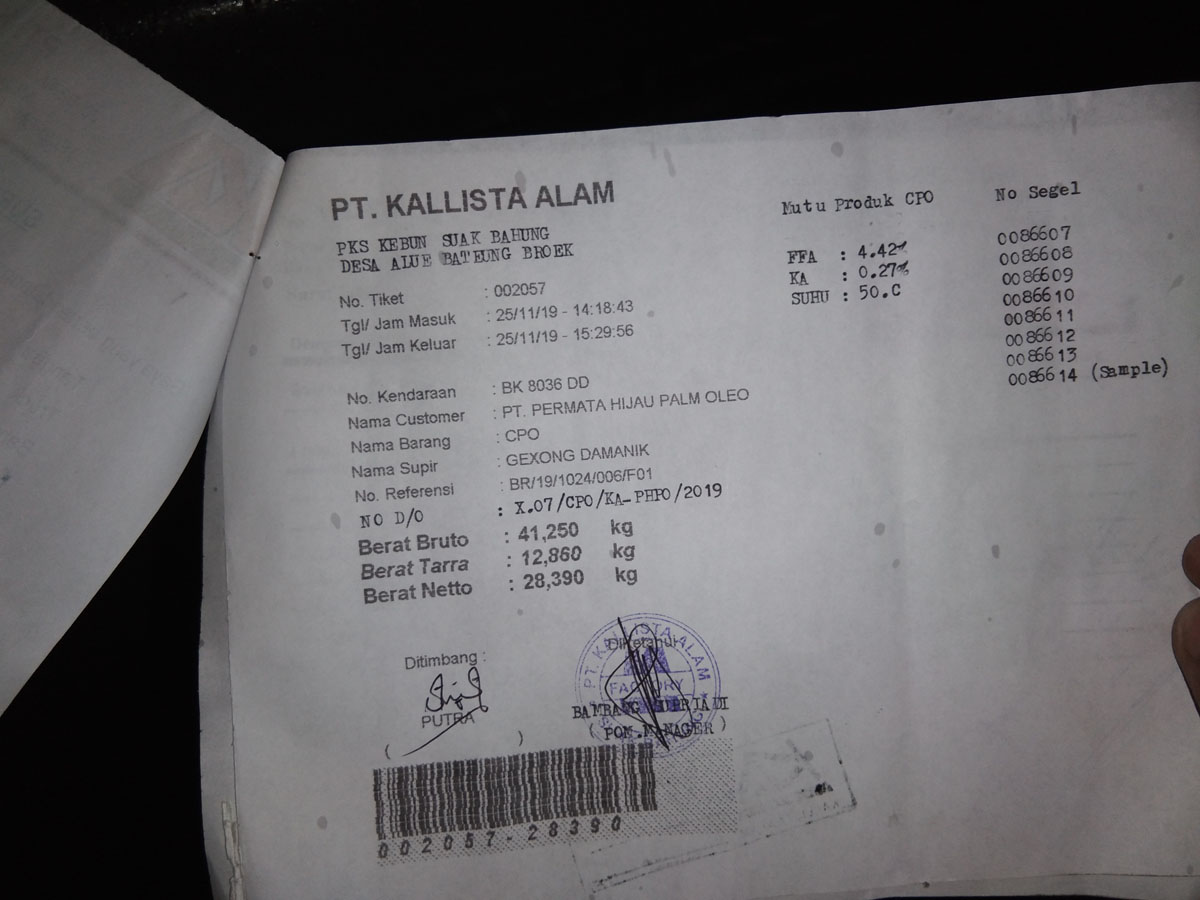
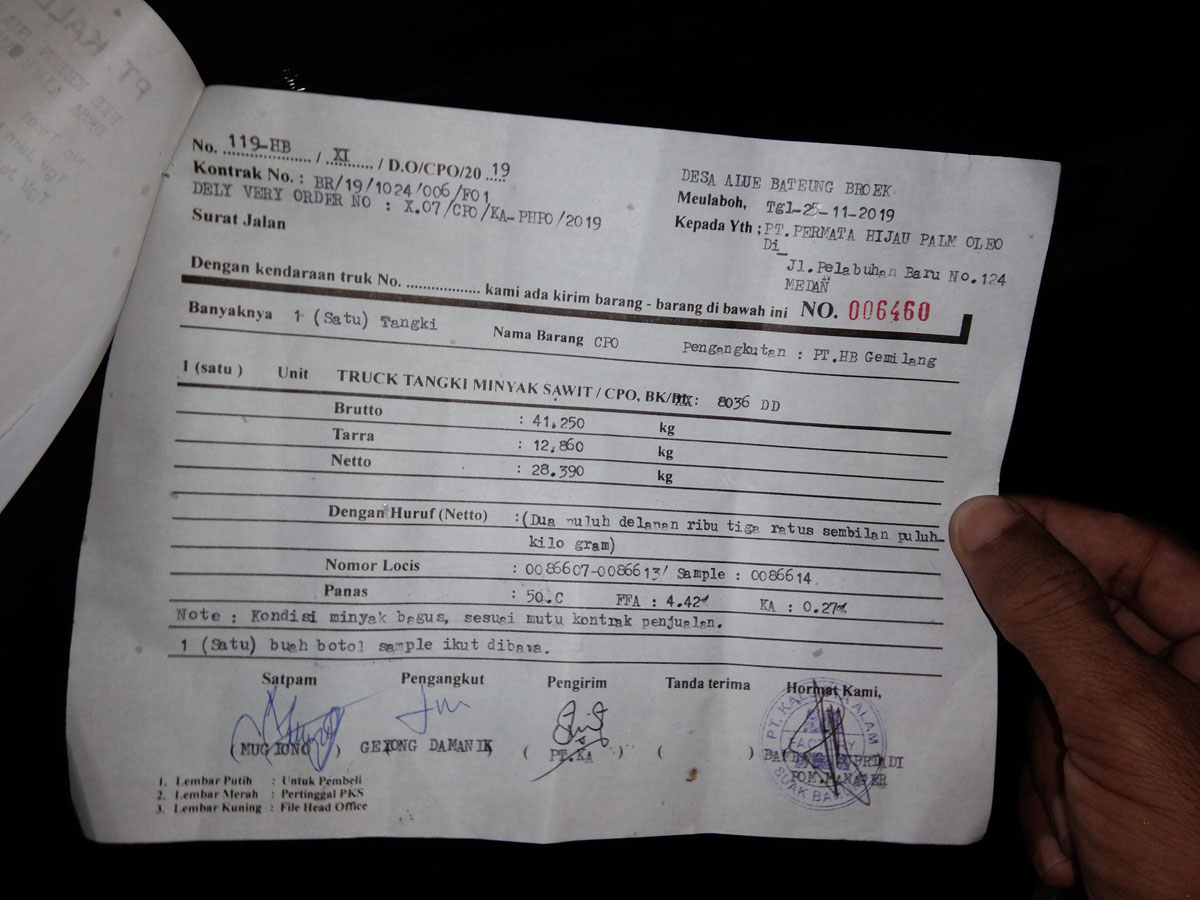
Researchers uncovered that PT. Kallista Alam is now selling to a major refinery located in Belawan, near Medan in North Sumatra, named Permata Hijau. Permata Hijau, and its trading arm in Singapore called Virgoz Oil and Fats, is among the top 10 processors and traders of palm oil in Indonesia and is known to supply palm oil to major markets, including the United States, India, China, Bangladesh, Indonesian, Pakistan and Russia. This is despite the fact that the company lacks any meaningful commitment to protect the Leuser Ecosystem or monitoring and compliance systems to ensure it isn’t sourcing palm oil from companies responsible for destroying Leuser’s lowland rainforests and peatlands.3 Permata Hijau’s policy4 and supplier code of practice5 claim that it requires its suppliers to comply with No Deforestation, No Peatland and No Exploitation practices, but our investigations have found that it continues to process and sell Conflict Palm Oil produced by PT. Kallista Alam.
Permata Hijau sources from a staggering 181 mills6 and only knows where 3% of the oil palm fruits it sources were grown. The published mill lists for its refinery PT. Permata Hijau Palm Oleo does not disclose its sourcing from PT. Kallista Alam’s mill during the period when field investigators caught it in the act of sourcing from the company. These lists also show that it did not know where a single percentage of the palm oil fruit processed and supplied to its refinery originated.7 Permata Hijau’s ability to trace the palm oil it processes to the location where it was grown is simply non-existent and evidence collected suggests that it may be intentionally not disclosing sourcing from the known problematic suppliers to its customers.
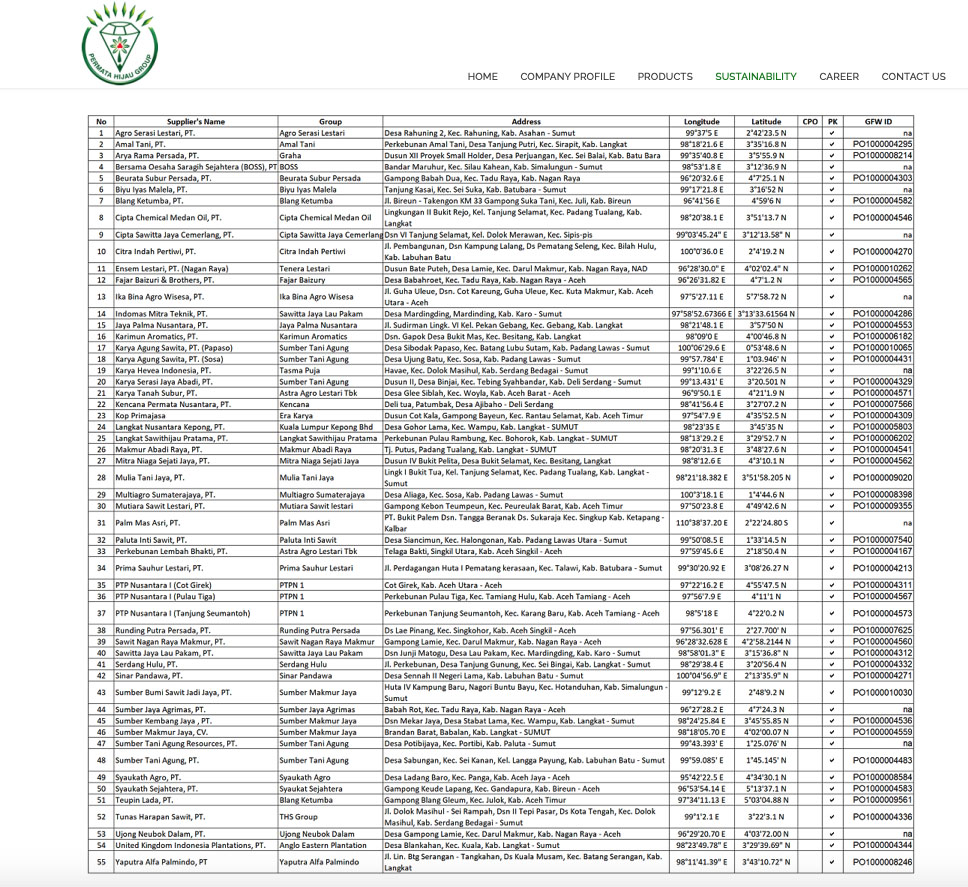
Permata Hijau is known as a major contributor to the leakage market that continues to accept and sell palm oil produced not in accordance with best practices demanded of major buyers. Permata Hijua has a track record of sourcing from producers engaging in deforestation and sources from 45 mills that are at risk of sourcing Conflict Palm Oil grown at the expense of the Leuser Ecosystem.8 Permata Hijau is also one of Indonesia’s largest producers of biofuels—another leakage market for irresponsibly produced palm oil produced at the expense of forests, peatlands and human rights. Despite this reputation, Permata Hijau continues to supply Cargill9—a major palm oil trader supplying Nestlé and Mars and countless other global brands. It has remained a top supplier of palm oil by volume to the USA, and an importer to the Japanese market, despite its lack of progress. The ongoing ability for this known processor to supply Conflict Palm Oil to both the US and Japanese markets shows the lack of implementation of responsible procurement policies by major traders and brands manufacturing consumer goods in both regions.
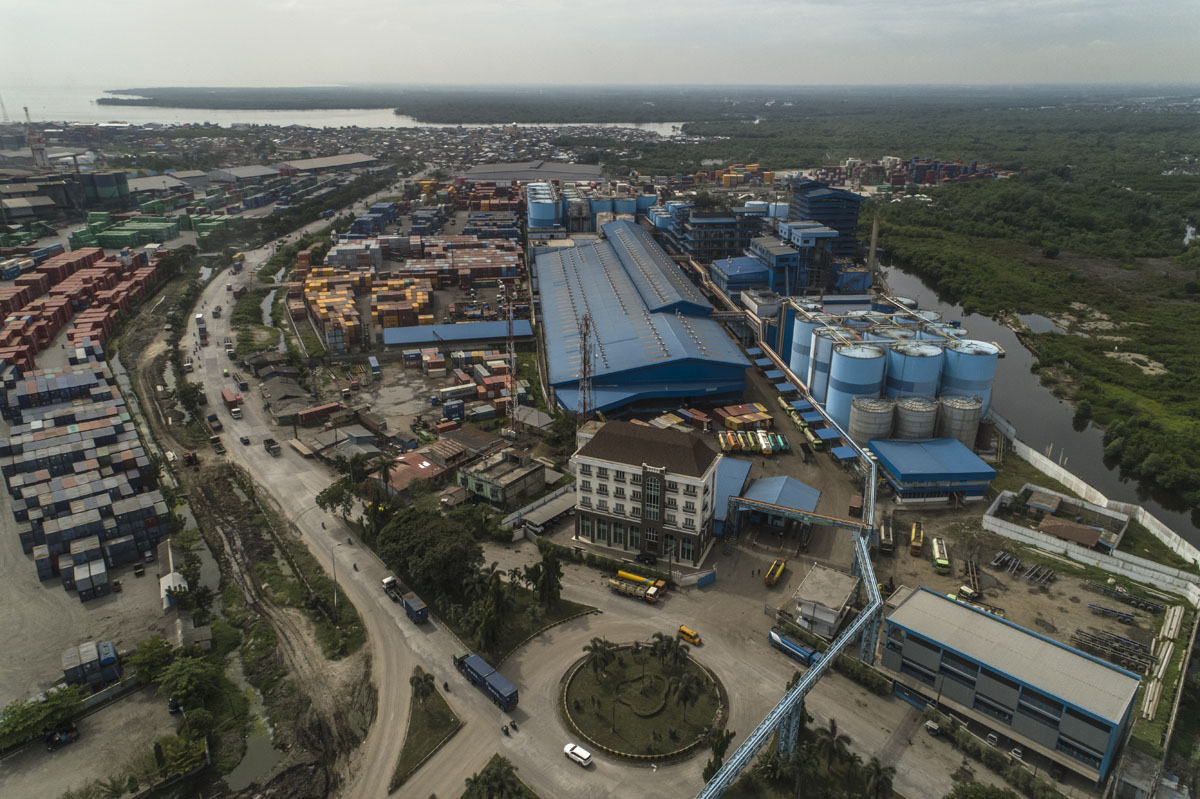
PT Kallista Alam is a textbook example of the kind of supplier that should have been explicitly excluded from the supply chains of any global brand committed to a No Deforestation, No Peat, No Exploitation (NDPE) policy. This case provides a clear litmus test of the legitimacy of these commitments among global brands.
Nestlé and Mars are two global brands that have been repeatedly exposed for sourcing Conflict Palm Oil grown at the expense of the peatlands in the Leuser Ecosystem. PT. Kallista Alam has been profiled by RAN and others as a rogue actor since 2011. But to date, both brands have failed to publish a No Buy policy on PT. Kallista Alam or provide evidence proving that they can guarantee that all processors of palm oil in their global supply chains have severed ties with the company or have stopped sourcing from any refinery that continues to do business with the rogue actor. Nestlé and Mars must publish a permanent No Buy policy for PT. Kallista Alam, immediately suspend sourcing from Permata Hijau and other suppliers such as Cargill if they fail to suspend sourcing from Permata Hijau, and engage all mills in close proximity to the Tripa peatland10 to ensure that palm oil produced by PT Kallista Alam and others at the expense of the Leuser Ecosystem is not sourced, sold and used to manufacture their products.
Join us in demanding that Nestlé and Mars intervene to protect Aceh’s peatlands in the Leuser Ecosystem from Conflict Palm Oil! With your help urgent action will be taken to hold PT. Kallista Alam to account for the destruction it has caused and to secure payments of its fines for illegally burning peatlands. Lasting solutions will need to be sought to ensure that remedy is delivered to local communities and that the Tripa peatland is restored to play the vital function it once performed — an orangutan capital of the world, a critical store of carbon, and a source of livelihoods for local communities.
- Nestlé. Supply Chain disclosure palm oil.
- Mars. Mars palm oil list for USA Latin America Asia Middle East Russia.
- Rainforest Action Network. Protecting the Leuser Ecosystem. A Shared Responsibility. Chain Reaction Research. NDPE Policies Cover 83% of Palm Oil Refineries. Implementation at 72%. NDPE Implementation of palm oil refineries increases to 75%
- Permata Hijau. Policy.
- Permata Hijau. Supplier code.
- Permata Hijau. Our commitment to sustainability.
- Permata Hijau. Supply chain reports semester 2 2019 (July-December)
- Chain Reaction Research. May 2020. NDPE Implementation of palm oil refineries increases to 75% . Permata Hijau. List of grievances and complaints.
- Cargill. Cargill Palm Oil Mill List. Nestlé. Supply Chain disclosure palm oil.
- Mills at risk of sourcing from PT Kallista Alam and Tripa Peatland are: PT. Beurata Subur Persada, PT. Cemerlang Abadi, PT. Dua Perkasa Lestari, PT. Ensem Lestari, PT. Raja Marga, PT. Sawit Nagan Raya Makmur, PT. Surya Panen Subur II, and PT. Ujong Neubok Dalam
